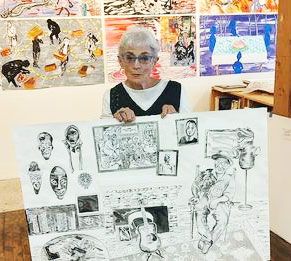 *
*
Recently I had a chance to talk with Karen Moss at her space in the Miller Street Studios in Somerville, Mass. I was introduced to her work at “Open Studios” – an event that the Somerville Arts Council puts on yearly. She told me that her work is always “about something” often touching on the social and the political issues of our time.

Karen Moss
According to her website:
“Boston-based artist Karen Moss explores social, historical and environmental issues through a variety of media including drawings, paintings and collage.”
Doug Holder: How has it been for you at the Miller Street Studios in Somerville?
Karen Moss: Well, I have only been here for a year. I was pressured to leave my Braintree Street Studio in Allston – there is a robotics company in its place now. I love being at Miller Street – and the landlord seems to love artists! Some 50 years ago I started at the Vernon Street Studios in Somerville. I was one of the three first tenants. Maude Morgan helped us find a space, so I guess I got my first start in Somerville.
DH: A lot of your work makes a political statement. You explore Native Americans, banned books, the subtext of children’s stories, colonialism, etc.
KM: There are a lot of different aspects to my work. I use political ideas as well as humor and pop culture. Some of my work is lighthearted. My work is about something, it has a narrative quality.
DH: Was your childhood full of creativity?
KM: In a show I presented, Life Before TV, I explored my own childhood before the birth of TV. As a child I drew all the time. I had a vivid imagination. I was influenced by children’s literature. It seems to me that most kids stop drawing, as reading and writing takes over their time. I always kept drawing. The kids I hung out always created imaginary projects. Until second grade I grew up in Jamaica Plain. There were a lot of parents who were involved in the arts, so it was a rich environment for me. My parents encouraged my creative side. In second grade we moved to Newton and again I was around creative kids. My mother, Norma Canner was once an actress and dancer on Broadway, so she always encouraged my creativity. There was a documentary made about her, A Time to Dance: The Life and Work of Norma Canner.
DH: Would you characterize your own work as dramatic?
KM: Some of it is a little dramatic. For instance, the Finger Print Project. This was a project that involved interviewing people in prison. I interviewed the bodyguard of Huey Newton (Black Panthers) “Big Bob,” as well as Meekah Scott, a member of the Framingham Eight, a group of women in Framingham State Prison who killed their abusers in self-defense. The fingerprints were the art. When you pressed one print, text would appear next to it.
DH: Tell us about your banned books project?
KM: This was a project where I painted people who were reading banned books. Many of the people I selected randomly, others I knew. The books chosen dealt with racism, gender, and sexuality. One of my subjects was a guard at the Rose Museum at Brandies University. He was reading a book by James Baldwin. Another subject was a young trans person who was reading the book The Perks of Being a Wildflower.
To find out more about Moss go to: https://www.karenmoss.com/. There will be an opening for Karen’s work at Gallery Kayafas in Boston, July 5, at 1:00 p.m.















Reader Comments